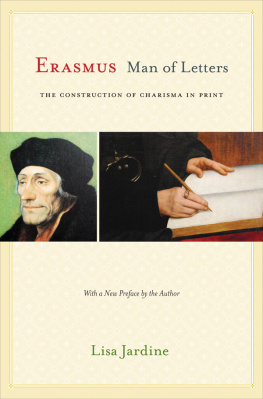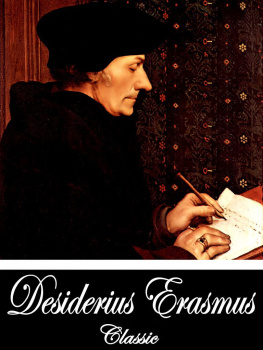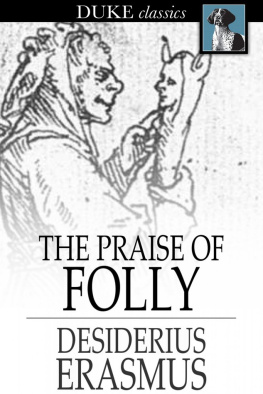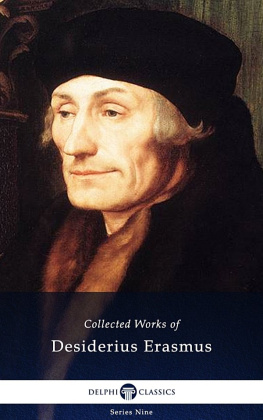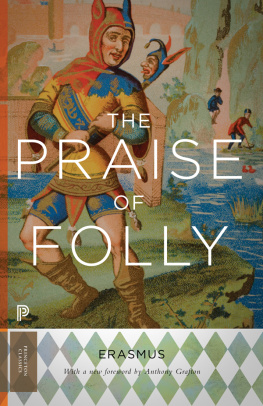Erasmus Desiderius - Erasmus, man of letters: the construction of charisma in print
Here you can read online Erasmus Desiderius - Erasmus, man of letters: the construction of charisma in print full text of the book (entire story) in english for free. Download pdf and epub, get meaning, cover and reviews about this ebook. City: Netherlands, year: 2015, publisher: Princeton University Press, genre: Detective and thriller. Description of the work, (preface) as well as reviews are available. Best literature library LitArk.com created for fans of good reading and offers a wide selection of genres:
Romance novel
Science fiction
Adventure
Detective
Science
History
Home and family
Prose
Art
Politics
Computer
Non-fiction
Religion
Business
Children
Humor
Choose a favorite category and find really read worthwhile books. Enjoy immersion in the world of imagination, feel the emotions of the characters or learn something new for yourself, make an fascinating discovery.
- Book:Erasmus, man of letters: the construction of charisma in print
- Author:
- Publisher:Princeton University Press
- Genre:
- Year:2015
- City:Netherlands
- Rating:5 / 5
- Favourites:Add to favourites
- Your mark:
- 100
- 1
- 2
- 3
- 4
- 5
Erasmus, man of letters: the construction of charisma in print: summary, description and annotation
We offer to read an annotation, description, summary or preface (depends on what the author of the book "Erasmus, man of letters: the construction of charisma in print" wrote himself). If you haven't found the necessary information about the book — write in the comments, we will try to find it.
Erasmus Desiderius: author's other books
Who wrote Erasmus, man of letters: the construction of charisma in print? Find out the surname, the name of the author of the book and a list of all author's works by series.
Erasmus, man of letters: the construction of charisma in print — read online for free the complete book (whole text) full work
Below is the text of the book, divided by pages. System saving the place of the last page read, allows you to conveniently read the book "Erasmus, man of letters: the construction of charisma in print" online for free, without having to search again every time where you left off. Put a bookmark, and you can go to the page where you finished reading at any time.
Font size:
Interval:
Bookmark:

Erasmus, Man of Letters
Erasmus, Man of Letters
THE CONSTRUCTION OF CHARISMA IN PRINT
Lisa Jardine
with a new preface by the author
PRINCETON UNIVERSITY PRESS
PRINCETON AND OXFORD
Copyright 1993 by Princeton University Press
Published by Princeton University Press, 41 William Street, Princeton, New Jersey 08540
In the United Kingdom: Princeton University Press, 6 Oxford Street, Woodstock, Oxfordshire OX20 1TW
All Rights Reserved
Third paperback printing, and first paperback printing with a new preface by the author, 2015
Paperback ISBN: 978-0-691-16569-1
Library of Congress Control Number: 2015930403
British Library Cataloging-in-Publication Data is available
This book has been composed in Linotron Sabon
Printed on acid-free paper.
press.princeton.edu
Printed in the United States of America
1 3 5 7 9 10 8 6 4 2
Contents
I NTRODUCTION |
C HAPTER O NE |
C HAPTER T WO |
C HAPTER T HREE |
C HAPTER F OUR |
C HAPTER F IVE |
C HAPTER S IX |
C ONCLUSION |
Illustrations
Preface to the New Paperback Edition
W HEN Erasmus, Man of Letters was published in 1993 I anticipated a chorus of criticism from Erasmus scholars, many of whom I had already heard give papers at conferences. Here I was, a presumptuous newcomer to the field, offering a controversial account of Desiderius Erasmuss self-fashioning in print, an account that incorporated innovative theoretical work alongside scrupulous scholarship to capture the startling originality of the great Dutch humanists writings and influence.
I could not have been more mistaken. Erasmus, Man of Letters was warmly received by Erasmians, across the Respublica litterarum. Scholars I greatly admired, like Heiko Oberman and Terence Cave, welcomed and approved of my evidence and the conclusions I drew in reviews in leading journals. At conferences I was greeted warmly by eminent figures like James McConica and Fokke Akkerman, eager to engage with my argument. I was welcomed into the family, as it were.
Erasmus had his familia and I have mine, I had written in my original acknowledgements. At that time I was referring to my circle of students, colleagues, and friends, who have always supported me in my intellectual pursuits. The appearance of Erasmus, Man of Letters enlarged that familia, and deepened my sense of awe at Erasmuss enduring ability to humanise a circle. The ripples of his influence, on humane learning and conduct, continue to spread, like those on the limpid surface of a large pond. My understanding of Erasmus and his humanist circles was deepened and enriched by their scholarly generosity.
Over the years I have come to regard the community of Erasmus scholars as the modern equivalent of Erasmuss familiaanalogous to those who began their careers in humane letters as the boyspueriwho lodged with him, studied under his guidance, and who then went out into the world to spread Erasmian humanism throughout Europe.
Erasmuss role as educator and trainer in humanistic mores of the young had always attracted me. If I had to choose my favourite work on Erasmusthe one I kept beside me while I was studying the great humanist myself, it would be Franz Bierlaires monograph, La familia dErasme (Vrin, 1968). This is a scrupulous little book on the young lodgers who Erasmus admitted to his household and trained up in humanistic skills, and who, in exchange, served as his copyists, secretaries, proofreaders, and domestic servants.
The good famulus rose at dawn, set the fire, saw to it that Erasmuss clothes were neat and brushed, polished his boots, did the washing, emptied his chamber pot, made his bed, cleaned the house, did the grocery shopping, and prepared the food. Trusted famuli also travelled, carrying Erasmuss letters to their destinations, negotiating in the local language (Erasmus did not bother himself with vernaculars), and collecting money owed.
Erasmus took his pueri into his home, clothed them, fed them, and trained them in the skills of the humanists trade: a fair written hand, fluent Latin and Greek, good manners and behaviour, a steady temperament. In return, once trained, they wrote to dictation (letters are described to their recipient as in his own voice, but the hand of another), copied and collated manuscripts, corrected proofs, and sometimes translated.
At the end of all of this, by the time the puer left Erasmus, he was an accomplished humanist and a civilised individual. As one of his former famuli, Gilbert Cousin, put it: I was lodged and fed under the best conditions, I learnt good manners, I acquired a great deal of knowledge, I made the acquaintance of men of distinction, I got rid of my peasant ways. As Bierlaire says, A stay with Erasmus as famulus was often the beginning of a brilliant career.
In 1511, the fourteen-year-old Stephen Gardiner, later Bishop of Winchester, and notorious for his capacity for serving the Protestant and Catholic regimes in England with equal grace and equanimity, became Erasmuss famulus in Paris. Sixteen years later, he wrote to his old teacher and mentor, recalling his time:
Do you recollect a time some sixteen years ago, when you were staying in Paris with an Englishman named Eden, who lived in the Street of St. John. Do you remember that there was then with Eden a boy whom you ordered every day to prepare you a dish of lettuce cooked with butter and vinegar, and you declared that the dish was more delicately served by him than it was anywhere else?
To which Erasmus replied: I recall the letters written by you no less vividly than I do the delight to my palate of the lettuces you then prepared with such artistry.
Gilbert Cousin openly boasted about his time in Erasmuss service and under his guidance. A mature young man in his twenties when he first encountered him, he became the elderly Erasmuss trusted amanuensis (a contemporary engraving shows the two at work on either side of the
This little manual or handbook for humanistic household service, became, in its turn, required reading for aspiring, humane individuals. Henry Knyvet, one of Henry VIIIs Gentlemen of the Privy Chamber, made his own famulus, Thomas Chaloner, translate the Oiketes, sive de officio famulorum into English. Chalonerwho published his translationlater described his household service as having confirmed his youth and mind in humanistic studies (studiis humanioribus), while to his former master he became a familiar friend and counsellor.
Through Erasmuss pueri, we reconnect with the magister whose brilliant strategies for engaging the whole of Europe with the humanist agenda I trace in my book. As Bierlaire puts it:
To study thus the life, the functions of these student-servants, is also to enter the intimate doman of a celebrated man by way of his valet de chambre: what was Erasmus like, how did he behave with regard to all these young people, was he a good master? We have tried to watch him live: how did a day unfold in the life of Erasmus, did he work hard, what were his daily preoccupations?
Next pageFont size:
Interval:
Bookmark:
Similar books «Erasmus, man of letters: the construction of charisma in print»
Look at similar books to Erasmus, man of letters: the construction of charisma in print. We have selected literature similar in name and meaning in the hope of providing readers with more options to find new, interesting, not yet read works.
Discussion, reviews of the book Erasmus, man of letters: the construction of charisma in print and just readers' own opinions. Leave your comments, write what you think about the work, its meaning or the main characters. Specify what exactly you liked and what you didn't like, and why you think so.

